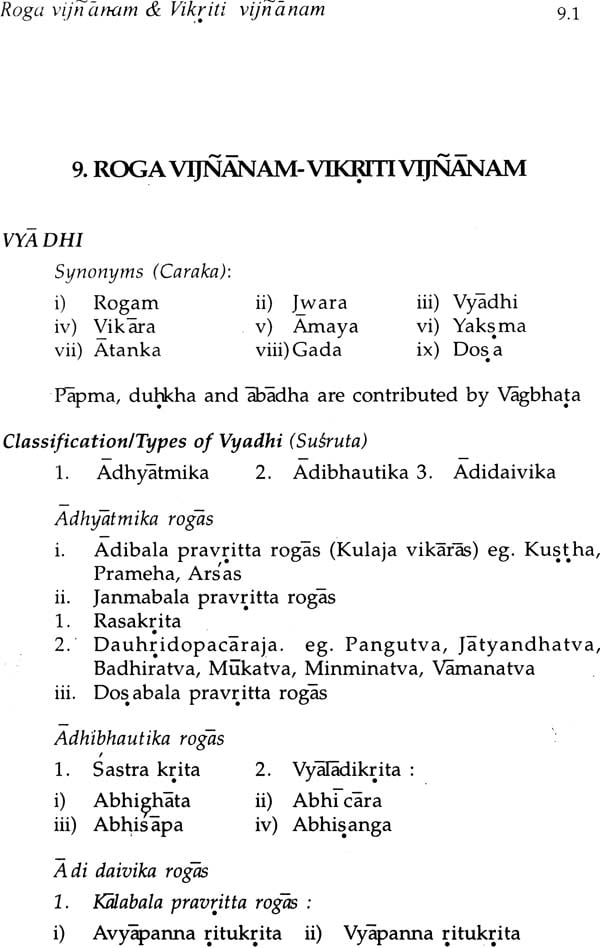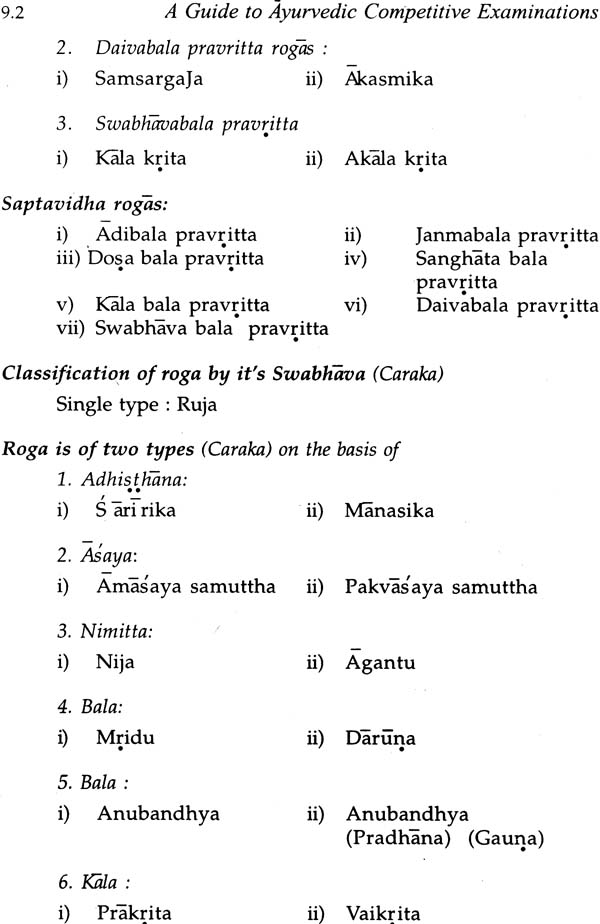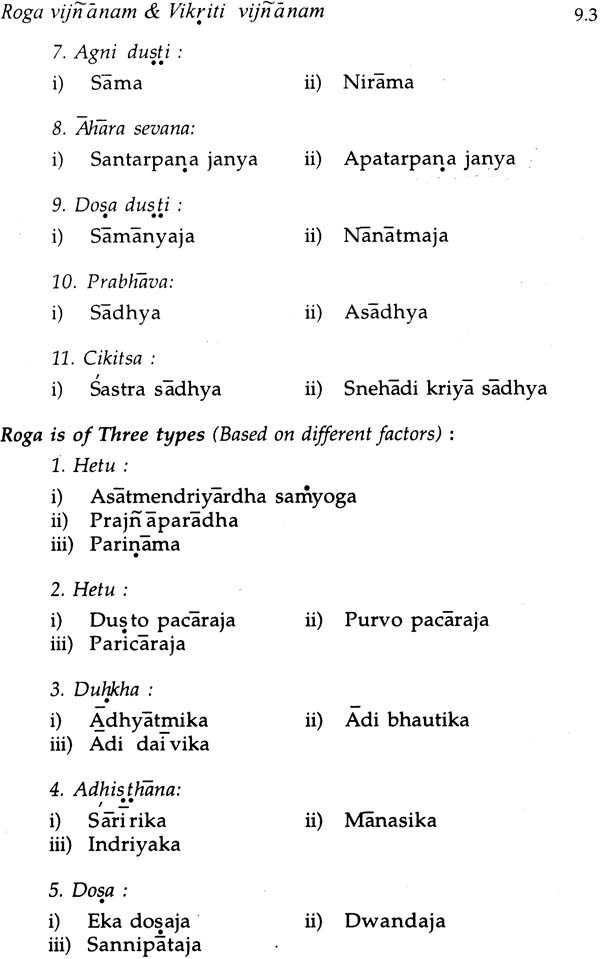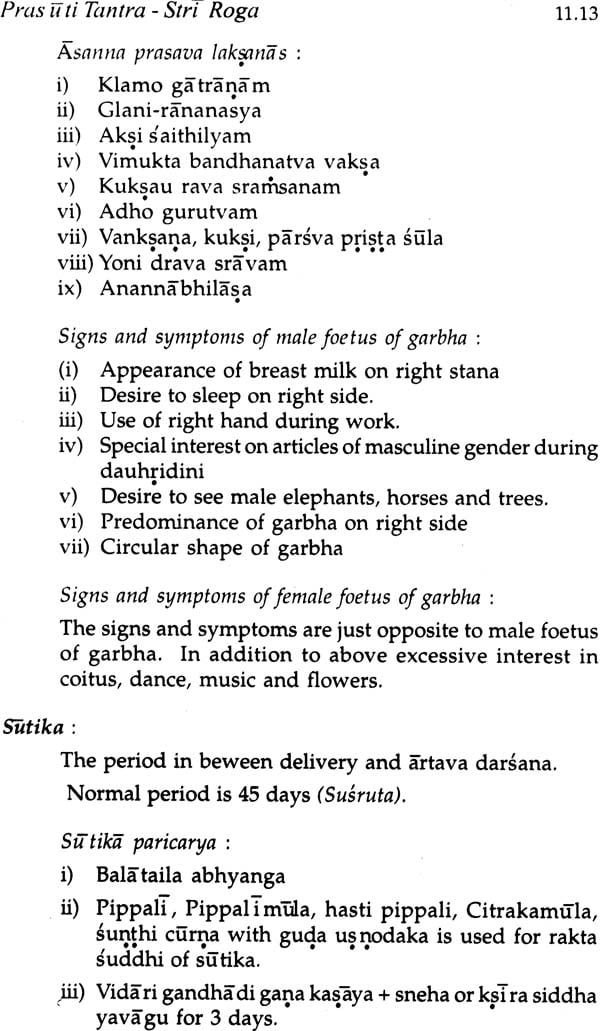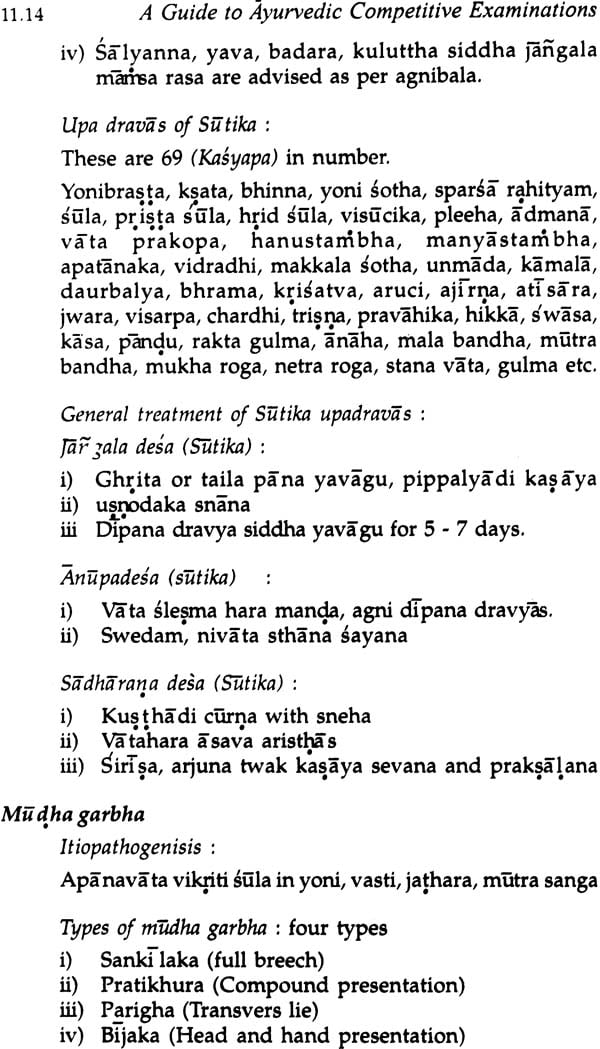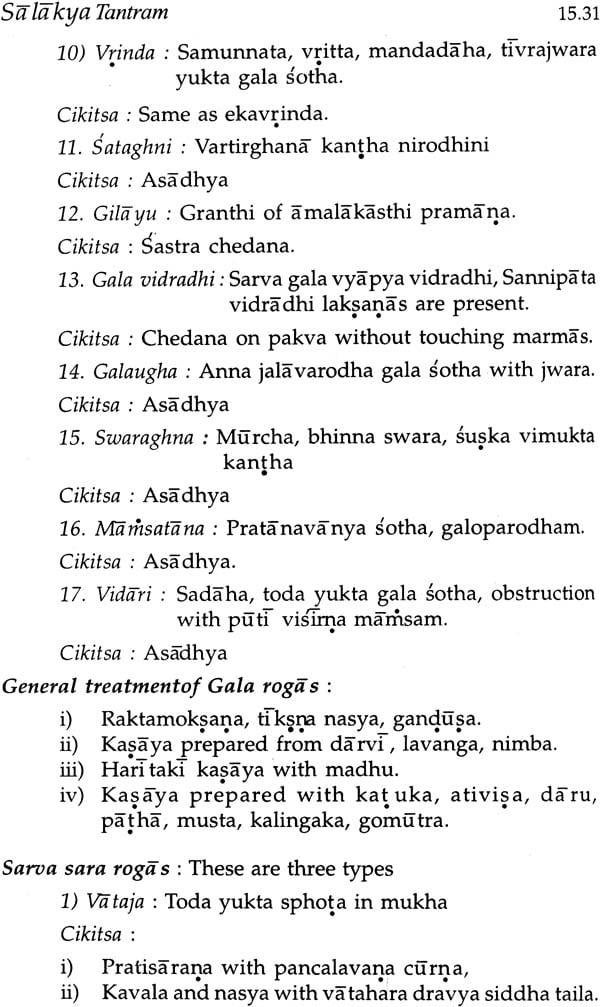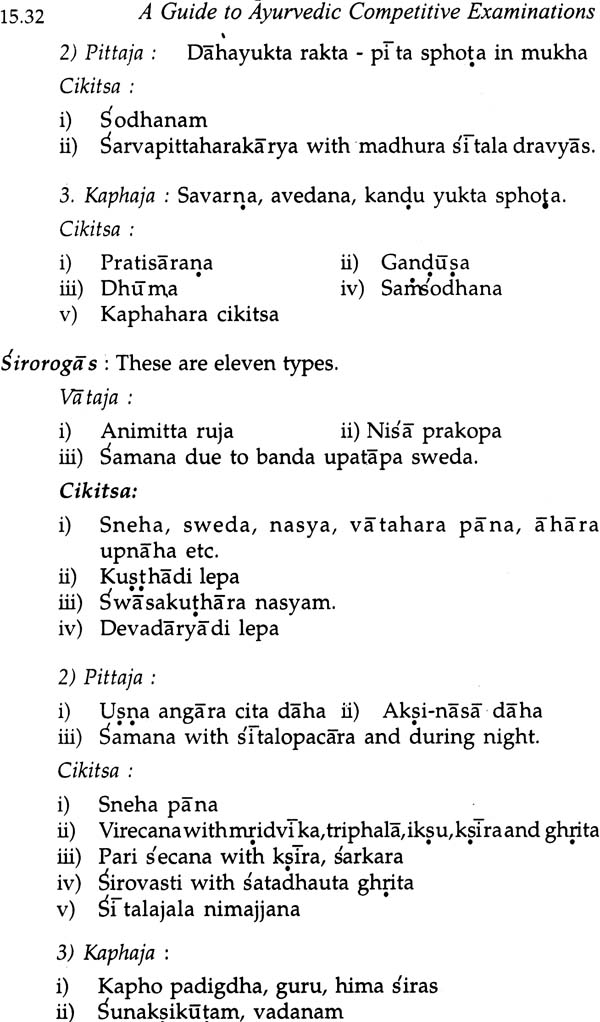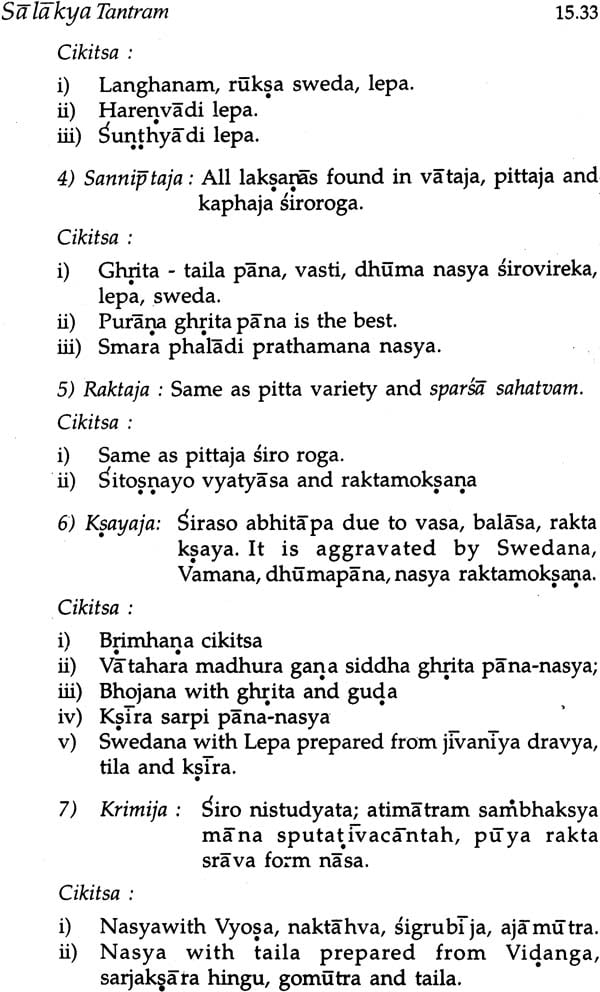
A Guide to Ayurvedic Competitive Examinations (P.G. Entrance Examinations. Medical Officer’s Screening tests, J.R.F. Examinations etc) (Volume 2)
Book Specification
| Item Code: | IDL057 |
| Author: | Dr. G. Prabhakara Rao |
| Publisher: | Chaukhambha Sanskrit Sansthan |
| Language: | English |
| Edition: | 2007 |
| Pages: | 794 |
| Cover: | Paperback |
| Other Details | 8.5” X 5.6” |
| Weight | 720 gm |
Book Description
Awareness of Ayurvedic in public, Professional competition among Ayurvedic physicians, Academic competition among Ayurvedic students, scholars, and competitions for P.G. Entrance, J.R.F., Medical officer screening is increasing day by day. As an observer, lover of Ayurveda I made an attempt to write ‘A Guide to Ayurvedic competitive examinations’. The part-I was already published and the response was overwhelming.
Now I am presenting a Part-II consists of following subjects:
Roga vijnanam – Vikriti vijnanam
Kaya cikitsa
Prasuti tantra – Stri roga
Kaumarabhritya
Agada tantra
Salya tantra
Salakya tantra
To create this book it took lot of time for the author to compile and go through all the available concerned literature.
This part of the competitive guide is very useful for those who are out of touch with the subjects for longer period and also it serves as a refresher and ready reconer. In this book each subjects is dealt with briefly but consisely and important materials are highlighted along with M.C.Q, & key. Each Multiple Choice Questions has given in a critical way in a possible tough nature, with most nearer answers. To solve the Questions the competitor should have through knowledge and should background. By solving such questions candidates will be completely out of confusion, anxiety and controversy. One more important feature of this book is addition of good number of related modern medicine Questions that are expected to be known to the students. Utmost care has been taken to remove controversies.
I am very much thankful to one and all who inspired, supported and helped and helped me directly and indirectly in different stages of my education.
Part II of the ’A Guide to Ayurvedic competitive examinations’ consists of:
Roga Vijnanam-Vikriti vijnanam
Kaya Cikitsa
Prasuti tantra-Stri Roga,
Kaumarabhritya
Agada tantra
Salya tantra
Salakya tantra
This book is very useful for those who are out of touch with the subjects for longer period and also it serves as a refresher and ready reconer. In this book each subjects is dealt with briefly but consisely and important materials are highlighted along with M.C.Q. & key. Each Multiple Choice Question has given in a critical way in a possible thought nature, with most nearer answers. One more important feature of this book is addition of good number of related modern medicine Questions that are expected to be known to the students. Utmost care has been taken to remove controversies.
| | ||
| S.No. Content | Page No. | |
| 1. | Vyadhi | 9.1 |
| 2. | Classification of Vyadhi | 9.1 |
| 3. | Adhyatmika rogas | 9.1 |
| 4. | Adhibhautika rogas | 9.1 |
| 5. | Adhi davika rogas | 9.1 |
| 6. | Sapta vidha rogas | 9.2 |
| 7. | Classification of roga by its swabhava | 9.2 |
| 8. | Roga is of two types | 9.2 |
| 9. | Roga is of three types | 9.3 |
| 10. | Caturvidha rogas | 9.4 |
| 11. | Saptavidha rogas (as per dosa) | 9.4 |
| 12. | Saptavidha rogas (Vagbhata) | 9.4 |
| 13. | Trividha roga margas | 9.4 |
| 14. | Bahya roga margaja rogas | 9.4 |
| 15. | Madhyama roga margaja rogas | 9.4 |
| 16. | Abhyantara rogamargaja rogas | 9.5 |
| 17. | Nanatmaja Vyadhies | 9.5 |
| 18. | Vataja nanatmaja vyadhies | 9.5 |
| 19. | Pittaja nanatmaja vyadhies | 9.6 |
| 20. | Kaphaja nanatmaja vyadhies | 9.6 |
| 21. | Nidanam | 9.7 |
| 22. | Types of Nidanam | 9.7 |
| 23. | Vyadhi bhodhaka Nidana | 9.7 |
| 24. | Types (Panca laksana Nidana) | 9.7 |
| 25. | Synonyms of Nidana | 9.7 |
| 26. | Types of Nidana | |
| 27. | Types of Nidana (Hariscandra) | 9.7 |
| 28. | Types of Nidana (disease producing capacity) | 9.7 |
| 29. | Purvarupa | 9.7 |
| 30. | Types | 9.7 |
| 31. | Rupa | 9.7 |
| 32. | Synonyms | 9.7 |
| 33. | Upasaya | 9.8 |
| 34. | Anupasaya | 9.8 |
| 35. | Samprapti | |
| 36. | Synonyms | 9.8 |
| 37. | Types | 9.8 |
| 38. | Nidanardhakara rogas | 9.8 |
| 39. | Rogi pariksa | 9.9 |
| 40. | Trividha pariksa (Caraka) | 9.9 |
| 41. | Trividha pariksa (Vagbhata) | 9.9 |
| 42. | Caturvidha pariksa (Susruta) | 9.9 |
| 43. | Sadvidha pariksa (Susruta0 | 9.9 |
| 44. | Astasthana paroksa (yogaratnakara) | 9.9 |
| 45. | Dasavidha pariksa (Caraka) | 9.9 |
| 46. | Dasavidha pariksyabhava (Caraka) | 9.9 |
| 47. | Itiologyfactors of different diseases | 9.10-9.15 |
| 48. | Samprapti involved in different diseases | 9.16-9.22 |
| 49. | Diseases and their types | 9.23-9.32 |
| 50. | Diseases and their specific dosik predominance | 9.32-9.35 |
| 51. | Diseases and their important purvarupas | 9.36-9.37 |
| 52. | Rogas and their samanya laksanas | 9.38-9.39 |
| 53. | Some important rupa of rogas | 9.39-9.46 |
| 54. | Rogas and their sadhya sadhyata | 9.46-9.49 |
| 55. | Rogas and their upadravas | 9.50 |
| 56. | Multiple choice questions | 9A.1-84 |
| 57. | Key to multiple choice questions | 9B.1-5 |
| | ||
| 1. | Synonyms of Kaya | 10.1 |
| 2. | Synonyms of Cikitsa | 10.1 |
| 3. | The main aim of cikitsa | 10.2 |
| 4. | Types of cikitsa (Caraka) | 10.2 |
| 5. | Daiva vyapasraya cikitsa | 10.2 |
| 6. | Yukti vyapasraya cikitsa | 10.2 |
| 7. | Satva vajaya cikitsa | 10.2 |
| 8. | General principle of cikitsa | 10.3 |
| 9. | Sadupa kramas | 10.3 |
| 10. | Santarpana | 10.3 |
| 11. | Apatarpana | 10.3 |
| 12.Cikitsa (Prayoga bedha) | 10.3 | |
| 13. | Kriyakala | 10.3 |
| 14. | Trividha bala | 10.3 |
| 15. | Types of dravya | 10.5 |
| 16. | Adravyabhuta cikitsa (Caraka) | 10.5 |
| 17. | Cikitsa sidhanta (Susruta) | 10.5 |
| 18. | Dhatu dosaja vikara cikitsa (Caraka) | 10.5 |
| 19. | Dosa cikitsa (Sresta tama) | 10.5 |
| 20. | Sroto dusti cikista sutra | 10.5-10.6 |
| 21. | Ausadhakala | 10.6 |
| 22. | Ausadhakala in vata vikara | 10.6 |
| 23. | Rogas and their cikitsa sutras | 10.7-10.24 |
| 24. | Drugas commonly used in Kaya cikitsa | 10.24 |
| 25. | Kasaya preparations and their indications | 10.25-10.27 |
| 26. | Curna preparations and their indications | 10.28-10.31 |
| 27. | Asavarista preparations and their indications | 10.31-10.33 |
| 28. | Avaleha preparations and their indications | 10.33-10.35 |
| 29. | Vati preparations and their indications | 10.36-10.37 |
| 30. | Guggulu prearations and their indications | 10.38-10.39 |
| 31. | Bhasma preparations and their indications | 10.39-10.41 |
| 32. | Rasausdhas and their indications | 10.42-10.45 |
| 33. | Lauha preparations and their indications | 10.46 |
| 34. | Pisti preparations and their indications | 10.46-10.47 |
| 35. | Parpati preparations and their indications | 10.47 |
| 36. | Kupi pakva rasayana preparations and their indications | 10.47-10.48 |
| 37. | Taila preparations and their indications | 10.48-10.53 |
| 38. | Ghrita preparations and their indications | 10.53-10.56 |
| 39. | Manasa roga vijnanam | 10.56 |
| 40. | Trigunas | 10.56 |
| 41. | Mano dosas | 10.56 |
| 42. | Manasa roga cikitsa | 10.56 |
| 43. | Unmada | 10.57 |
| 44. | Apasmara | 10.57 |
| 45. | Atatvabhi nivesa | 10.57-10.58 |
| 46. | Murcha | 10.58 |
| 47. | Sanyasa | 10.58 |
| 48. | Pancakarma therapy | 10.59 |
| 49. | Purva karma | 10.59 |
| 50. | Sneha karma | 10.59 |
| 51. | Classification of sneha dravyas | 10.60 |
| 52. | Classification of sthavara sneha (Susruta) | 10.60 |
| 53. | Abhyantara sneha | 10.60-10.61 |
| 54. | Bahya sneha | 10.61 |
| 55. | Sadyah sneha | 10.61 |
| 56. | Description of sneha dravyas | 10.61 |
| 57. | Ghrita | 10.61 |
| 58. | Taila | 10.61-10.62 |
| 59. | Vasa and majja | 10.62 |
| 60. | Important terms for sneha | 10.62 |
| 61. | Sneha anupanas | 10.62-10.63 |
| 62. | Sneha mantra (Caraka, Vagbhata) | 10.63 |
| 63. | Sneha mantra (Susruta) | 10.63 |
| 64. | Duration of sneha (Dalhana) | 10.63 |
| 65. | Diet suggested after sneha | 10.64 |
| 66. | Indications of sneha karma | 10.64 |
| 67. | Contra indication of sneha karma | 10.64 |
| 68. | Sweda karma | 10.64 |
| 69. | Properties of Swedana dravyas | 10.65 |
| 70. | Classification of sweda | 10.65 |
| 71. | Agni sweda | 10.65 |
| 72. | Niragni sweda | 10.65 |
| 73. | Ruksa sweda | 10.65 |
| 74. | Snigdha sweda | 10.65 |
| 75. | As per sthana-types | 10.66 |
| 76. | As per quality-types | 10.66 |
| 77. | As per Susruta & Vagbhata types | 10.66-10.67 |
| 78. | Dalhanas view on 13 types of Sweda | 10.67 |
| 79. | Effect of Sweda karma | 10.67 |
| 80. | Indications of Sweda as per Caraka | 10.67-10.68 |
| 81. | Contra indications of Sweda (Caraka) | 10.68 |
| 82. | Sign and symptoms of Samyak svinna | 10.68 |
| 83. | Sign and symptoms of asvinna | 10.68 |
| 84. | Signs and symptoms of atisweda | 10.69 |
| 85. | Sweda karma atiyoga cikitsa | 10.69 |
| 86. | Vamana karma | 10.69 |
| 87. | Qualities of vamaka dravyas | 10.69 |
| 88. | Vamaka dravyas | 10.69-10.70 |
| 89. | Stages observed in Vamana Karma as per Caraka | 10.70 |
| 90. | Four ways to knowing the vamana | 10.70 |
| 91. | Dosa of Vamaka dravya | 10.70-10.71 |
| 92. | Indications of vamana | 10.71 |
| 93. | Contraindications of Vamana | 10.71-10.72 |
| 94. | Samyak vamana laksanas | 10.72 |
| 95. | Asamyak Vamana laksanas | 10.72 |
| 96. | Ativamana laksanas | 10.73 |
| 97. | Vamana vyapath | 10.73 |
| 98. | Samsarjana karma of vamana | 1073.-10.74 |
| 99 | Virecana karma | 10.74 |
| 100. | Best virecana dravyas (Caraka) | 10.74 |
| 101. | Best virecana dravyas (Susruta) | 10.74 |
| 102. | Virecana drayvas (Sargadhara) | 10.75 |
| 103. | Pakvasayagata dosharavirecana dravyas | 10.75 |
| 104. | Bhedani dravyas (Caraka) | 10.75 |
| 105. | Virecanopayogi dravyas (caraka) | 10.75 |
| 106. | Dose of virecana drayvas | 1087-10.76 |
| 107. | Virecana dravyas qualities | 10.76 |
| 108. | Indications if virecana karma | 10.76 |
| 109. | Contra indications of virecana karma | 10.76-10.77 |
| 110. | Description of virecana karma in respect of suddhi | 10.77 |
| 111. | Samyak virecana laksanas | 10.77 |
| 112. | Ayogya virecana laksanas | 10.77 |
| 113. | Atiyoga virecana laksanas | 10.78 |
| 114. | Vasti Karma 10.78 | |
| 115. | Types according to adhist hana | 10.78 |
| 116. | Types as per dravyas | 10.78 |
| 117. | Types as per pharmacological actions | 10.79 |
| 118. | Types of vasti as per anusangika | 10.79 |
| 119. | Vasti yantra | 10.79-80 |
| 120. | Vasti netra dosas | 10.80 |
| 121. | Vasti putaka dosas | 10.80 |
| 122. | Indications of asthapana vasti | 10.80-81 |
| 123. | Contra indications of asthapana vasti | 10.81-82 |
| 124. | Contra indication of anuvasana vasti | 10.81-82 |
| 125. | Vasti samyak yoga laksana | 10.82 |
| 126. | Vasti ayoga laksanas | 10.82 |
| 127. | Vasti atiyoga laksanas | 10.82 |
| 128. | Nasya karma | 10.83 |
| 129. | Synonyms | 10.83 |
| 130. | Types as per (Caraka) | 10.83 |
| 131. | Types of nasya as per action | 10.83-10.84 |
| 132. | Navana nasya indications | 10.84 |
| 133. | Indication of Nasya in general | 10.84-10.85 |
| 134. | Contra indication of nasya | 10.85-10.86 |
| 135. | Rakta moksana | 10.87 |
| 136. | Synonyms | 10.87 |
| 137 | Types and indications | 10.87 |
| 138. | Rakta moksana indications | 10.87 |
| 139. | Contra indications of Raktamoksana | 10.88 |
| 140. | Raktamoksana kala | 10.88 |
| 141. | Raktamoksana dose | 1089 |
| 142. | Jalukavacarana | 10.89 |
| 143. | Siravyadha | 10.89 |
| 144. | Site of siravyadha indications | 10.89-10.90 |
| 145. | Rasayana tantram | 10.90 |
| 146. | Effects of Rasayana | 10.91 |
| 147. | Types of Rasayana | 10.91 |
| 148. | Types of Rasayana (Susruta) | 10.91 |
| 149 | Kamya Rasayana | 10.92 |
| 150. | Medhya Rasayana | 10.92 |
| 151. | Best medhya rasayana | 10.92 |
| 152. | Bhallataka rasayana yogas | 10.92 |
| 153. | Amalaka rasayana yogas | 10.92 |
| 154. | Changes in ageing as per Sarangadhara and Vagbhata | 10.93 |
| 155. | Triphala rasayana | 10.93 |
| 156. | Pippali vardhamana rasayana (Caraka) | 10.93-94 |
| 157. | Pippali rasayana | 10.94 |
| 158. | Silajatu rasayana | 10.94 |
| 159. | Dose and duration | 10.94 |
| 160. | Apathya during silajatu rasayana | 10.95 |
| 161. | Carakokta rasayanas padas | 10.95 |
| 162. | Buddhi medhakara gana | 10.95 |
| 163. | Susrutokta rasayana | 10.95 |
| 164. | Sarvopaghata samaniyam | 10.95 |
| 165. | Medhayuskamiya rasayanam | 10.96 |
| 166. | Swabhava vyadhi pratisedhaniyam | 10.96 |
| 167. | Vajikarana tantra | 10.96 |
| 168. | Effects | 10.96 |
| 169. | Utility | 10.96 |
| 170. | Best vajikarana | 10.96 |
| 171. | Best vrisya | 10.97 |
| 172. | Selection of Stri | 10.97 |
| 173. | Vajikarana purva karma | 10.97 |
| 174. | Vjikarana dravyas | 10.97 |
| 175. | Age limit | 10.97 |
| 176. | Sukra srava hetu | 10.97 |
| 177. | Sukra ksaya | 10.98 |
| 178. | Klibata | 10.98 |
| 179. | Vajikarana yogas | 10.98 |
| 180. | Multiple choice questions | 10A.1 – 125 |
| 181. | Key to multiple choice questions | 10B.1-8 |
| | ||
| 1. | Description of stri | 11.1 |
| 2. | Best type of stri | 11.1 |
| 3. | Best qualities of uttama stri | 11.1 |
| 4. | Stages of stri | 11.1 |
| 5. | Extra organs present in stri | 11.1 |
| 6. | Rajah (Rajas) | 11.2 |
| 7. | Synonyms | 11.2 |
| 8. | Ritu kala | 11.2 |
| 9. | Qualities of ritumati | 11.2 |
| 10. | Qualities of suddhartava | 11.2 |
| 11. | Rajah Pravritti vaya | 11.2 |
| 12. | Rajah pravritti kala | 11.2 |
| 13. | Dosas involved in rajah pravritti | 11.2 |
| 14. | Artava dosas | 11.3 |
| 15. | Asadhya artava dosas | 11.3 |
| 16. | Treatment of sadhya artava dosas | 11.3 |
| 17. | Garbhadanam | 11.3 |
| 18. | Garbhadana yogya vayah | 11.3 |
| 19. | Garbha sambhava samagri | 11.3 |
| 20. | Garbha vakranti | 11.4 |
| 21. | Signs and aymptoms of garbha | 11.4 |
| 22. | Sadyo grihi ta garbha laksanas (Susruta) | 11.5 |
| 23. | Sadyo grihi ta garbha laksanas (Caraka) | 11.5 |
| 24. | Garbha laksanas | 11.5 |
| 25. | Pumsavana vidhi | 11.5 |
| 26. | Garbhopaghata kara bhavas | 11.6 |
| 27. | Garbhini paricarya | 11.6-11.8 |
| 28. | Pathyam during pregnancy | 11.8 |
| 29. | Garbha vyapad – Garbha srava | 11.8 |
| 30. | Garbhapata upadravas | 11.9 |
| 31. | Treatment of garbha pata upadravas | 11.9 |
| 32. | Garbhapata | 11.9 |
| 33. | Adhmanam | 11.9 |
| 34. | Mutra sanga | 11.9 |
| 35. | Preventive remedies of garbha/srava | 11.9-10 |
| 36. | Abnormalities of garbha | 11.10 |
| 37. | Upavistaka | 11.10 |
| 38. | Nagodara | 11.10 |
| 39. | Treatment of Upavistaka and nagodara | 11.11 |
| 40. | Lina garbha (Susruta) | 11.10 |
| 41. | Treatment | 11.10 |
| 42. | Upadravas of garbha and their treatment | 11.11 |
| 43. | Sosa | 11.11 |
| 44. | Hrillasa | 11.11 |
| 45. | Chardi | 11.11 |
| 46. | Jwara | 11.11 |
| 47. | Pandu | 11.11 |
| 48. | Kamala | 11.11 |
| 49. | Mutravibandham | 11.12 |
| 50. | Parikartika | 11.12 |
| 51. | Makkala sula | 11.12 |
| 52. | Asana prasava laksanas | 11.13 |
| 53. | Signs and symptoms of male fetus of garbha | 11.13 |
| 54. | Sign and symptoms of female fetus of garbha | 11.13 |
| 55. | Sutika | 11.13 |
| 56. | Sutika paricarya | 11.13-11.14 |
| 57. | Mudha garbha | 11.14 |
| 58. | Mudha garbha gati | 11.15 |
| 59. | Asabhya mudha garbha laksanas | 11.15 |
| 60. | Mudha garbha upadravas | 11.15 |
| 61. | Treatment of Mubhagarbha | 11.15 |
| 62. | Sutika rogas | 11.15-16 |
| 63. | Stri Roga | 11.17 |
| 64. | Yonivyapath | 11.17 |
| 65. | Nidana of yonivyapath | 11.17 |
| 66. | Types of yonivyapath | 11.17 |
| 67. | Dosik predominance | 11.17 |
| 68. | Description of yonivyapath and their treatment | 11.17 |
| 69. | Udavarta | 11.17-11.18 |
| 70. | Vanghya | 11.18 |
| 71. | Vipluta | 11.18 |
| 72. | Paripluta | 11.18 |
| 73. | Vatala | 11.19 |
| 74. | Lohita ksaya | 11.19 |
| 75. | Vamini | 11.19 |
| 76. | Prasramsini | 11.19 |
| 77. | Putraghni | 11.19 |
| 78. | Pittala | 11.19 |
| 79. | Atyananda | 11.20 |
| 80. | Aticarana | 11.20 |
| 81. | Acarana | 11.20 |
| 82. | Karnini | 11.20 |
| 83. | Slesmala | 11.20-21 |
| 84. | Andini | 11.21 |
| 85. | Sandini | 11.21 |
| 86. | Mahati | 11.21 |
| 87. | Suci vakra | 11.21 |
| 88. | Sarvaja | 11.21 |
| 89. | Asadhya rogas (yonivyapath) | 11.21 |
| 90. | Upapluta | 11.21 |
| 91. | Antarmukhi | 11.21 |
| 92. | Suska yoni | 11.21 |
| 93. | Prakcarana | 11.21 |
| 94. | Asrigdhara | 11.22-23 |
| 95. | Yoni kanda | 11.23 |
| 96. | Yonarsas | 11.23-24 |
| 97. | Soma roga | 11.24 |
| 98. | Sweta pradara | 11.24-25 |
| 99. | Garbha pratibandhaka cikitsa | 11.25 |
| 100. | Multiple choice questions | 11A.1-66 |
| 101. | Key to multiple choice questions | 11B.1-4 |
| | ||
| | ||
| 1. | Stages of age (Carak) | 12.1 |
| 2. | Stages of age (Susruta) | 12.1 |
| 3. | Stages of age (Kasyapa) | 12.1 |
| 4. | Samskara | 12.2 |
| 5. | Danta vijnanam | 12.2 |
| 6. | Stanya ksira vijnanam | 12.2 |
| 7. | Properties of ksira (Vagbhata) | 12.2 |
| 8. | Properties of Stanya (Susruta) | 12.3 |
| 9. | Properties of Stanya (Caraka) | 12.3 |
| 10. | Properties of Stanya (Vagbhata) | 12.3 |
| 11. | Properties of Godugdha (Susruta) | 12.3 |
| 12. | Properties of chaga ksira (Susruta) | 12.3-12.4 |
| 13. | Ksira dosas | 12.4 |
| 14. | Vairasya dosa cikitsa | 12.4 |
| 15. | Phena sanghata dosa cikitsa | 12.4 |
| 16. | Ruksa dosa cikitsa | 12.4 |
| 17. | Vivarnya dosa cikitsa | 12.4 |
| 18. | Durgandha dosa cikitsa | 12.4-5 |
| 19. | Ati snigdha dosa cikitsa | 12.5 |
| 20. | Picchila dosa cikitsa | 12.5 |
| 21. | Guru dosa cikitsa | 12.5 |
| 22. | Bala rogas | 12.5 |
| 23. | Signs and inferences of balaroga | 12.5-12.6 |
| 24. | Dusta stanya vyadhi | 12.6 |
| 25. | Ksiralasaka | 12.6 |
| 26. | Kukunaka | 12.7 |
| 27. | Ahiputanaka | 12.7-8 |
| 28. | Bala sosa | 12.8 |
| 29. | Parigarbhika | 12.8 |
| 30. | Mridbhaksana janya vyadhies | 12.8 |
| 31. | Upasirsaka | 12.9 |
| 32. | Ajagallika | 12.9 |
| 33. | Nabhi janya rogas | 12.9 |
| 34. | Ulbaka roga | 12.10 |
| 35. | Paridagdharoga | 12.10 |
| 36. | Talu kantaka | 12.10 |
| 37 | Mahapadma | 12.11 |
| 38. | Kuranda roga | 12.11 |
| 39. | Phakka roga | 12.11-12 |
| 40. | Mutrasmari | 12.12 |
| 41. | Niruddha prakasa | 12.12 |
| 42. | Sanniruddha guda | 12.12-13 |
| 43. | Guda bhramsa | 12.13 |
| 44. | Pascaruja | 12.13 |
| 45. | Bala graha vijnanam | 12.13 |
| 46. | Grahavesa nidana | 12.13 |
| 47. | Types of graha | 12.13-14 |
| 48. | Graha grahana karana | 12.14 |
| 49. | Graha vesita bala purva rupa | 12.14 |
| 50. | Samanya laksanas of bala graharoga | 12.14-12.15 |
| 51. | Graha samanya rupa | 12.15 |
| 52. | Skanda graha laksanas | 12.15 |
| 53. | Skandapasmara laksanas | 12.16 |
| 54. | Sakuni graha laksanas | 12.16 |
| 55. | Revati graha laksanas | 12.16 |
| 56. | Putana graha laksanas | 12.16 |
| 57. | Andha putana graha laksanas | 12.16 |
| 58. | Sita putana graha laksanas | 12.16 |
| 59. | Mukha mundatika graha | 12.17 |
| 60. | Naigamesa graha laksanas | 12.17 |
| 61. | Svagraha laksanas | 12.17 |
| 62. | Pitrigraha laksanas | 12.17 |
| 63. | Suskarevati graha laksanas | 12.17 |
| 64. | Skanda graha cikitsa (Susruta) | 12.18 |
| 65. | Skanda graha cikitsa (vagbhata) | 12.18 |
| 66. | Skandapasmara graha cikitsa (Susruta) | 12.18 |
| 67. | Skandapasmara graha cikitsa | 12.18 |
| 68. | Sakuni graha cikitsa (Vagbhata) | 12.19 |
| 69. | Sakuni graha cikitsa (Vagbhata) | 12.19 |
| 70. | Revati graha cikitsa (Susruta) | 12.20 |
| 71. | Revati graha cikitsa (Vagbhata) | 12.20 |
| 72. | Putana graha cikitsa (Susruta) | 12.20 |
| 73. | Putana graha cikitsa (vagbhata) | 12.21 |
| 74. | Andha putana cikitsa | 12.21 |
| 75. | Andha putana cikitsa (Susruta) | 12.21 |
| 76. | Sita Putana cikitsa (Susruta) | 12.22 |
| 77. | Mukha mandatika | 12.22 |
| 78. | Mukha mandatika cikitsa (Vagbhata) | 12.22-23 |
| 79. | Naigamesa cikitsa (Susruta) | 12.23 |
| 80. | Naiga mesa cikitsa (Vagbhata) | 12.23 |
| 81. | Svagraha cikitsa (Vagbhata) | 12.23-24 |
| 82. | Pitri graha cikitsa | 12.24 |
| 83. | Suska revati graha cikitsa | 12.24 |
| 84. | Multiple Choice Questions | 12A.1-38 |
| 85 | Key to Multiple choice questions. | 12B.1-3 |
| | ||
| 1. | Description of visa | 13.1 |
| 2. | Types of visa (Caraka, Susruta) | 13.1 |
| 3. | Types of visa (Vagbhata) | 13.1 |
| 4. | Maha visas | 13.2 |
| 5. | Upa visas | 13.2 |
| 6. | Visa yoni | 13.2 |
| 7. | Sthavara visa adhisthanas | 13.2 |
| 8. | Jangama visa adhisthanas | 13.2 |
| 9. | Classification of visas | 13.3 |
| 10. | Suicidal poisons | 13.3 |
| 11. | Homicidal poisons | 13.3 |
| 12. | Abortaficient poisons | 13.3 |
| 13. | Corrosive poisons | 13.3 |
| 14. | Irritant poisons | 13.3 |
| 15. | Cerebral poisons | 13.3 |
| 16. | Spinal poisons | 13.3 |
| 17. | Peripheral nervous system poisons | 13.3 |
| 18. | Cardiac poisons | 13.4 |
| 19. | Asphyxiants | 13.4 |
| 20. | Poisons cause sudden death | 13.4 |
| 21. | Poisons cause loss of consciousness | 13.4 |
| 22. | Poisons cause heart failure | 13.4 |
| 23. | Poisons cause paleness of the face | 13.4 |
| 24. | Poisons cause delerium | 13.4 |
| 25. | Poisons cause titanic like convulsions | 13.4 |
| 26. | Poisons cause paralysis | 13.4 |
| 27. | Poisons cause mydriasis | 13.4 |
| 28. | Poisons cause miasis | 13.5 |
| 29. | Poisons cause dry skin | 13.5 |
| 30. | Poisons cause wet skin | 13.5 |
| 31. | Poisons cause vomitting | 13.5 |
| 32. | Jangama visas and their poison | 13.5 |
| 33. | Spreading of poison | 13.6 |
| 34. | Visa gunas | 13.6 |
| 35. | Visa gunas as per Sarangdhara | 13.6 |
| 36. | Effect of visa (Vagbhata) | 13.6 |
| 37. | Visa Vegas and their effects | 13.6-13.7 |
| 38. | The signs & symptoms of visa Vegas (Susruta) | 13.7 |
| 39. | Toxic effects of visas based on adhistana | 13.7-13.8 |
| 40. | Toxic effects of poisons | 13.8 |
| 41. | Visopa krama | 13.8 |
| 42. | Visa cikitsa in response to vega as described in classics | 13.9 |
| 43. | General signs and symptoms of visa (Caraka) | 13.9 |
| 44. | Jangama visa | 13.9 |
| 45. | Sthavara visa | 13.9 |
| 46. | Description of visa dravyas | 13.9 |
| 47. | Vatsanabha | 13.9-10 |
| 48. | Ahiphena | 13.10 |
| 49. | Jaya pala | 13.10 |
| 50. | Dhattura | 13.11 |
| 51. | Gunja | 13.11 |
| 52. | Visa musti | 13.11 |
| 53. | Bhanga | 13.12 |
| 54. | Arka ksira | 13.12 |
| 55. | Snuhi ksira | 13.12 |
| 56. | Karavira | 13.13 |
| 57. | Langali | 13.13 |
| 58. | Bhallataka | 13.13 |
| 59. | Jangama visa | 13.14 |
| 60. | Sarpa | 13.14 |
| 61. | Number of different types of Sarpa | 13.14 |
| 62. | Davikara sarpa visa laksanas | 13.14 |
| 63. | Mandali sarpa visa laksanas | 13.15 |
| 64. | Rajimana sarpa visa laksanas | 13.15 |
| 65. | Factors potentiating visa in sarpa | 13.15 |
| 66. | Types of sarpa damsa | 13.15 |
| 67. | Sarpa visa vegas | 13.16 |
| 68. | Sarpa visa nasaka ausadhas | 13.16 |
| 69. | Apathya of sarpa visa | 13.16 |
| 70. | Vricchika | 13.16-17 |
| 71. | Satapadi | 13.17 |
| 72. | Luta | 13.17 |
| 73. | Types of Luta | 13.18 |
| 74. | Toxic effects of Luta | 13.18 |
| 75. | Seat of visa in luta | 13.18 |
| 76. | Cikitsa | 13.18-19 |
| 77. | Musaka | 13.19-20 |
| 78. | Alarka | 13.20 |
| 79. | Alarka visa laksanas | 13.20 |
| 80. | Cikitsa | 13.21 |
| 81. | Dusi visa | 13.21 |
| 82. | Sadhya sadhyata | 13.22 |
| 83. | Cikitsa | 13.22 |
| 84. | Garavisa | 13.22 |
| 85. | Materials used for garavisa | 13.22 |
| 86. | Laksanas of gara visa | 13.22 |
| 87. | Cikitsa | 13.23 |
| 88. | Visahara yogas and indications | 13.23 |
| 89. | Multiple choice questions | 13A.1-15 |
| 90. | Key to multiple choice questions. | 13B.1 |
| | ||
| 1. | Salya | 14.1 |
| 2. | Importance of Salya tantra | 14.1 |
| 3. | Trividha karma | 14.1 |
| 4. | Yantra | 14.1 |
| 5. | Types | 14.1 |
| 6. | Pradhana tama yantra | 14.2 |
| 7. | Number of different yantras (Susruta) | 14.2 |
| 8. | Yantra karmas | 14.2 |
| 9. | Yantra dosas | 14.2 |
| 10. | Sastra | 14.3 |
| 11. | Names of sastra | 14.3 |
| 12. | Sastra gunas | 14.3 |
| 13. | Sastra dosas | 14.4 |
| 14. | Sastra payana | 14.4 |
| 15. | Sastra Karmas | 14.4 |
| 16. | Sastra and their function | 14.4 |
| 17. | Measurement of sastra | 14.5 |
| 18. | Anu sastra | 14.5 |
| 19. | Sastra used as per karma | 14.5 |
| 20. | Chedana karma | 14.5 |
| 21. | Bhedana karma | 14.6 |
| 22. | Lekhana karma | 14.6 |
| 23. | Visravana karma | 14.6 |
| 24. | Vedhana karma | 14.6 |
| 25. | Aharana karma | 14.6 |
| 26. | Esana karma | 14.6 |
| 27. | Sivana karma | 14.6 |
| 28. | Bandhana | 14.7 |
| 29. | Bandhana and their uses as per site | 14.7 |
| 30. | Ksera karma (Susruta) | 14.8 |
| 31. | Ksara karmas (Susruta) | 14.8 |
| 32. | Ksara types | 14.8 |
| 33. | Ksara gunas | 14.8 |
| 34. | Ksara dosas | 14.8 |
| 35. | Ksara properties | 14.9 |
| 36. | Paniya ksara | 14.9 |
| 37. | Properties | 14.9 |
| 38. | Indications | 14.9 |
| 39. | Contra indications | 14.9 |
| 40. | Antidote | 14.9 |
| 41. | Agni karma | 14.10 |
| 42. | Dahana upakaranas | 14.10 |
| 43. | Dahana upakaranas and their uses | 14.10 |
| 44. | Characters of agni karma as per site | 14.10 |
| 45. | Agni karma as per Susruta | 14.10 |
| 46. | Types of Agni karma (Vagbhata) | 14.11 |
| 47. | Types of agni karma as per seat | 14.11 |
| 48. | Types of agni karma as per Character | 14.11 |
| 49. | Indications of agnikarma | 14.11 |
| 50. | Contra indications of agni karma | 14.11 |
| 51. | Importance of agni karma | 14.11 |
| 52. | Upakarmas | 14.12 |
| 53. | Saptokramas | 14.12 |
| 54. | Sastyopa kramas | 14.12-13 |
| 55. | Vrana | 14.13 |
| 56. | Vrana parigraha | 14.13 |
| 57. | Vrana pariksa | 14.13 |
| 58. | Vrana gandha | 14.13 |
| 59. | Vrana srava | 14.13 |
| 60. | Vranopa dravas (Susruta) | 14.14 |
| 61. | Vranopa dravas (Caraka) | 14.14 |
| 62. | Surgical diseases and their types | 14.14-14.18 |
| 63. | Sastra karmas and their indications | 14.19-14.20 |
| 64. | Surgical diseases and their cikitsa (Susruta) | 14.20 |
| 65. | Sadyovrana | 14.20 |
| 66. | Bhagna | 14.20-21 |
| 67. | Arsas | 14.25 |
| 68. | Asmari | 14.25 |
| 69. | Bhagandhara | 14.25-14.26 |
| 70. | Virdradhi | 14.26-14.27 |
| 71. | Nadi vrana | 14.28 |
| 72. | Granthi | 14.28-30 |
| 73. | Apaci | 14.30-31 |
| 74. | Arbuda | 14.31-32 |
| 75. | Galaganda | 14.32 |
| 76. | Vriddhi cikitsa | 14.33-34 |
| 77. | Medovriddhi | 14.34 |
| 78. | Mutra vriddhi | 14.34 |
| 79. | Antra vriddhi | 14.34 |
| 80. | Upadamsa | 14.35 |
| 81. | Slipada | 14.35 |
| 82. | Ksudra roga | 14.35 |
| 83. | Ajagallika | 14.35-36 |
| 84. | Andhalaji | 14.36 |
| 85. | Yavaprakhya | 14.36 |
| 86. | Panasika | 14.36 |
| 87. | Kaccapi | 14.36 |
| 88. | Pasana gardhabhi | 14.36 |
| 89. | Vivrita | 14.36 |
| 90. | Indraviddha | 14.36 |
| 91. | Gardabhi | 14.36 |
| 92. | Jala garbhabha | 14.36 |
| 93. | Irivilla | 14.36 |
| 94. | Gandhanamni | 14.36 |
| 95. | Kaksa | 14.36 |
| 96. | Vispota | 14.36 |
| 97. | Cipya | 14.36 |
| 98. | Kunaka | 14.36 |
| 99. | Vidarika | 14.37 |
| 100. | Sarkararbuda | 14.37 |
| 101. | Kacchu | 14.37 |
| 102. | Vicarcika | 14.37 |
| 103. | Pama | 14.37 |
| 104. | Padadari | 14.37 |
| 105. | Alasaka | 14.37 |
| 106. | Kadara | 14.38 |
| 107. | Indralupta | 14.38 |
| 108. | Arumsika | 14.38 |
| 109. | Darunaka | 14.38 |
| 110. | Masurika | 14.38 |
| 111. | Jatumani | 14.38 |
| 112. | Masaka | 14.38 |
| 113. | Tila kalaka | 14.38 |
| 114. | Nyaccha | 14.39 |
| 115. | Vyanga | 14.39 |
| 116. | Nilika | 14.39 |
| 117. | Yavana pitaka | 14.39 |
| 118. | Padmini kantaka | 14.39 |
| 119. | Parikartika | 14.39 |
| 120. | Avapatika | 14.39 |
| 121. | Niruddha parakasa | 14.39-40 |
| 122. | Anati vriddha valmika | 14.40 |
| 123. | Pakva valmika | 14.40 |
| 124. | Ahiputana | 14.40 |
| 125. | Vrisana kaccu | 14.40 |
| 126. | Guda bhramsa | 14.40 |
| 127. | Suka roga cikitsa | 14.41 |
| 128. | Sarsapika | 14.41 |
| 129. | Astilaka | 14.41 |
| 130. | Granthika | 14.41 |
| 131. | Kumbhika | 14.41 |
| 132. | Alaji | 14.41 |
| 133. | Mridita | 14.41 |
| 134. | Sammudha pitika | 14.41 |
| 135. | Avamantha | 14.42 |
| 136. | Puskarika | 14.42 |
| 137. | Sparsa hani | 14.42 |
| 138. | Uttama | 14.42 |
| 139. | Sataponaka | 14.42 |
| 140. | Twakpaka | 14.42 |
| 141. | Sonitarbuda | 14.42 |
| 142. | Mamsarbuda | 14.42 |
| 143. | Mamsapaka | 14.42 |
| 144. | Virdadhi | 14.42 |
| 145. | Tilakalaka | 14.42 |
| 146. | Multiple choice Questions | 14A.1-60 |
| 147. | Key to multiple choice questions. | 14B.1-4 |
| | ||
| 1. | Netra rogas | 15.1 |
| 2. | Netra angas | 15.1 |
| 3. | Netra pancabhautikatvam15.1 | |
| 4. | Netra sandhies | 15.2 |
| 5. | Nidana of netra rogas | 15.2 |
| 6. | Samprapti | 15.2 |
| 7. | Number of Netra rogas | 15.2 |
| 8. | Classification based on dosas | 15.2 |
| 9. | Classification based on netrangas | 15.2-3 |
| 10. | Paksma rogas | 15.3 |
| 11. | Vartma rogas | 15.3 |
| 12. | Sandhi rogas | 15.3 |
| 13. | Sukla mandala rogas | 15.3 |
| 14. | Krisna mandala rogas | 15.4 |
| 15. | Dristi mandala rogas | 15.4 |
| 16. | Sarva gata rogas | 15.4 |
| 17. | Vataja netra rogas | 15.4 |
| 18. | Pittaja netra rogas | 15.4 |
| 19. | Kaphaja netra rogas | 15.5 |
| 20. | Rakta netra rogas | 15.5 |
| 21. | Sannipataja netra rogas | 15.5 |
| 22. | Bahya rogas | 15.5-6 |
| 23. | Vhedya netra rogas | 15.6 |
| 24. | Lekhya netra rogas | 15.6 |
| 25. | Bhedhya netra rogas | 15.6 |
| 26. | Vedhya netra rogas | 15.6 |
| 27. | Asastra krit netra rogas | 15.7 |
| 28. | Netra kriya kalpa | 15.7 |
| 29. | Seka | 15.7 |
| 30. | Ascotanam | 15.7-8 |
| 31. | Bidalaka | 15.8 |
| 32. | Tarpana | 15.8 |
| 33. | Putapaka | 15.8 |
| 34. | Anjana | 15.9 |
| 35. | Netra roga cikitsa | 15.9-12 |
| 36. | Pathya in netra rogas | 15.13 |
| 37. | Apathya in netra rogas | 15.13 |
| 38. | Karna rogas | 15.13 |
| 39. | Nidanam | 15.13 |
| 40. | Samprati | 15.13 |
| 41. | Number of karnarogas | 15.13-14 |
| 42. | Karnapalini rogas | 15.14 |
| 43. | Important points in karna rogas and treatment | 15.14 |
| 44. | Karna purana therapy in different karna rogas | 15.15-16 |
| 45. | Nasarogas | 15.16 |
| 46. | Nidanam | 15.16 |
| 47. | Samprapti | 15.16 |
| 48. | Types | 15.17 |
| 49. | Important points in Nasarogas and treatment | 15.17-19 |
| 50. | Mukha rogas | 15.20 |
| 51. | Nidanam | 15.20 |
| 52. | Number of mukha rogas | 15.20 |
| 53. | Osthagata rogas | 15.20 |
| 54. | Danta rogas | 15.20 |
| 55. | Danta mula gata rogas | 15.20-21 |
| 56. | jihwa rogas | 15.21 |
| 57. | Talu rogas | 15.21 |
| 58. | Gala rogas | 15.21 |
| 59. | Sarva sara mukha | 15.21 |
| 60. | Asadhya mukharogas | 15.21-22 |
| 61. | Description of osta rogas | 15.22-23 |
| 62. | Description of Danta mula rogas | 15.23-26 |
| 63. | Description of Danta rogas | 15.26-27 |
| 64. | Jihwagata rogas | 1528 |
| 65. | General treatment of jihwa rogas | 15.28 |
| 66. | Talurogas | 15.29 |
| 67. | Gala rogas | 15.30-31 |
| 68. | General treatment of Galarogas | 15.31 |
| 69. | Sarva sara rogas | 15.31-32 |
| 70. | Siro rogas | 15.32 |
| 71. | Vataja | 15.32 |
| 72. | Pittaja | 15.32 |
| 73. | Kaphaja | 15.32-33 |
| 74. | Sannipataja | 15.33 |
| 75. | Raktaja | 15.33 |
| 76. | Ksayaja | 15.33 |
| 77. | Krimija | 15.33 |
| 78. | Suryavarta | 15.34 |
| 79. | Ananta vata | 15.34 |
| 80. | Sankhaka | 15.34 |
| 81. | Ardhavabhedaka | 15.34 |
| 82. | General yogas | 15.34 |
| 83. | Pathya | 15.35 |
| 84. | Apathya | 15.35 |
| 85. | Multiple choice questions | 15A.1-41 |
| 86. | Key to Multiple choice questions. | 15B.1-3 |
